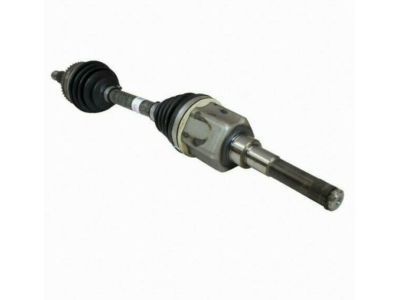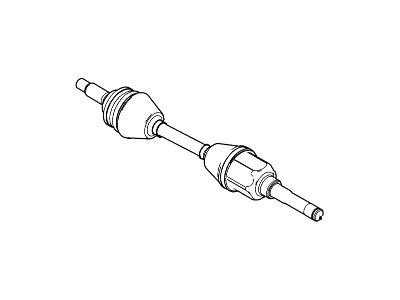To remove the front, start by loosening the wheel lug nuts, raise the vehicle and support it securely on jackstands, then remove the wheel. Next, remove the axle shaft/hub nut from the axle and discard it, and if equipped with antilock brakes, remove the wheel speed sensor and set it aside. Separate the lower control arm from the steering knuckle. Swing the knuckle/hub assembly out until the end of the axle shaft is free of the hub. If the axle shaft splines stick in the hub, tap on the end of the axle shaft with a plastic hammer. Support the outer end of the axle shaft with a piece of wire to avoid unnecessary strain on the inner CV joint. If removing the right axle shaft, carefully pry the inner CV joint off the intermediate shaft using a large screwdriver or prybar positioned between the CV joint housing and the intermediate shaft bearing support. If removing the left axle shaft, pry the inner CV joint out of the transaxle using a large screwdriver or prybar positioned between the transaxle and the CV joint housing. Be careful not to damage the differential seal. Support the CV joints and carefully remove the axle shaft from the vehicle. To install, pry the old spring clip from the inner end of the axle shaft (left side) or outer end of the intermediate shaft (right side) and install a new one. Lubricate the differential or intermediate shaft seal with multipurpose grease and raise the axle shaft into position while supporting the CV joints. Position the spring clip with the opening facing down. Push the splined end of the inner CV joint into the differential side gear (left side) or onto the intermediate shaft (right side) and make sure the spring clip locks in its groove. Apply a light coat of multi-purpose grease to the outer CV joint splines, pull out on the steering knuckle assembly and install the stub axle into the hub. Insert the ball joint stud into the steering knuckle and tighten the pinch bolt. Install a new axle shaft/hub nut and tighten it before the vehicle is lowered in order to keep the vehicle's weight from damaging the wheel bearing. This can be done by having an assistant use the brake to lock the hub while you tighten the nut, or by bracing a long prybar across two of the wheel studs. Grasp the inner CV joint housing (not the axle shaft) and pull out to make sure the axle shaft has seated securely in the transaxle or on the intermediate shaft. Install the wheel and lug nuts, then lower the vehicle and tighten the lug nuts.For the intermediate shaft removal, remove the right side wheel cover or hub cap and break the hub nut loose with a socket and large breaker bar. Loosen the wheel lug nuts, raise the vehicle and support it securely on jackstands, then remove the wheel. Separate the lower control arm from the steering knuckle. Remove the axle shaft/hub nut from the axle and discard it. Swing the knuckle/hub assembly out until the end of the axle shaft is free of the hub. If the axle shaft splines stick in the hub, tap on the end of the axle shaft with a plastic hammer. Support the outer end of the axle shaft with a piece of wire to avoid unnecessary strain on the inner CV joint. Remove the axle shaft. Remove the bearing support nuts and slide the intermediate shaft out of the transaxle. Be careful not to damage the differential seal when pulling the shaft out. Check the support bearing for smooth operation by turning the shaft while holding the bearing. If you feel any roughness, take the intermediate shaft to an automotive machine shop or other qualified repair facility to have a new bearing installed. For the installation, lubricate the lips of the transaxle seal with multi-purpose grease. Carefully guide the intermediate shaft into the transaxle side gear then install the mounting nuts for the bearing support and tighten them. The remainder of installation is the reverse of removal.For 2004 and earlier models rear removal, block the front wheels to prevent the vehicle from rolling. Loosen the wheel lug nuts, raise the rear of the vehicle and support it securely on jackstands, then remove the wheel. Remove the axle shaft/hub nut and discard it. Remove the coil spring. Remove the nut and detach the trailing arm from the lower suspension arm ball joint. Pry the trailing arm outward and remove the outer end of the axle shaft from the hub. Don't let the axle shaft hang by the inner CV joint. Pry the inner end of the axle shaft out of the differential and remove it from the vehicle. For installation, pry the old spring clip from the inner end of the axle shaft and install a new one. Apply a light film of grease to the area on the inner CV joint stub shaft where the seal rides, then insert the splined end of the inner CV joint into the differential. Make sure the spring clip locks in its groove. Apply a light film of grease to the outer CV joint splines, pry the trailing arm outward and insert the outer end of the axle shaft into the hub. Install the coil spring. Connect the trailing arm to the lower suspension arm and install the nut. Using a floor jack, raise the trailing arm to simulate normal ride height, then tighten the nut. Install a new axle shaft/hub nut and tighten it before the vehicle is lowered in order to keep the vehicle's weight from damaging the wheel bearing. This can be done by having an assistant use the brake to lock the hub while you tighten the nut, or by bracing a long prybar across two of the wheel studs. Install the wheel and lug nuts, then lower the vehicle and tighten the lug nuts. Block the front wheels to keep the vehicle from rolling. Loosen the rear wheel lug nuts, raise the vehicle and support it securely on jackstands, then remove the wheel. Remove the rear wheel axle shaft hub nut and discard it. Remove the coil spring. Remove the wheel speed sensor wiring harness mounting bolt. Remove the four bolts from the stabilizer bar bracket and discard them. Place a floor jack under the knuckle and support it. Remove the bolt from the lower ball joint, then separate the ball joint from the knuckle. Separate the inner and outer ends of the axle shaft from the differential and the hub. Work carefully to avoid damaging the CV joints and boots. Installation is the reverse of removal. Tighten the axle shaft/hub nut before the vehicle is lowered in order to keep the vehicle's weight from damaging the wheel bearing. This can be done by having an assistant use the brake to lock the hub while you tighten the nut, or by bracing a long prybar across two of the wheel studs.
Posted by FordPartsGiant Specialist 


